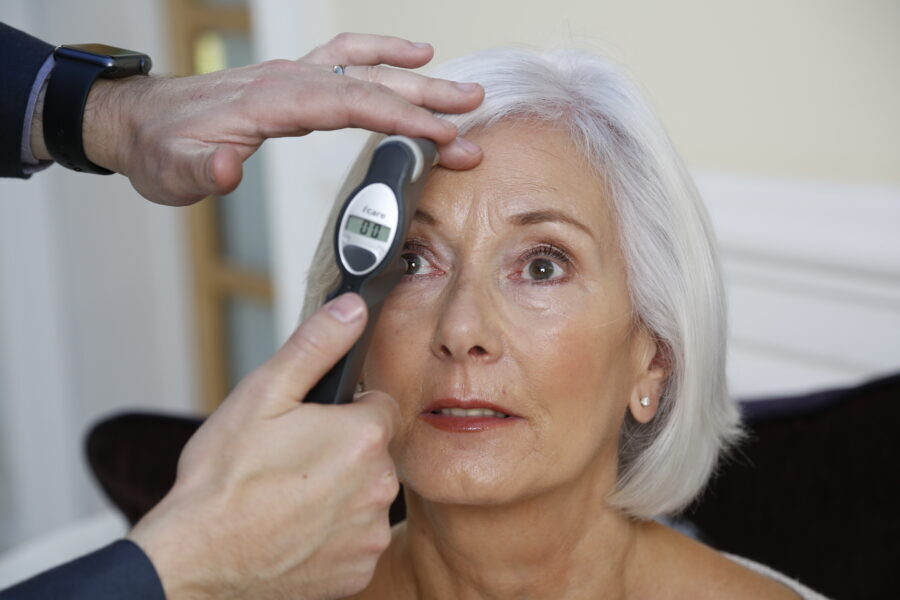

Blog post
Nystagmus: Causes, treatments, signs and symptoms

Vishal Khurana BSc(Hons) McOptom - Domiciliary Optometrist and Director of Business Development
5 minute read time
What is nystagmus?
Nystagmus is an eye condition where the eyes make rhythmical, repetitive and uncontrollable movements.
These movements can be side to side (horizontal), up and down (vertical), or in a circular motion (rotary).
It can affect one or both eyes and often leads to visual disturbances.
How does nystagmus affect vision?
Nystagmus can cause blurry or shaky vision, making it difficult to focus on objects.
The constant eye movement means that the brain receives an unstable image, which can lead to reduced visual clarity and depth perception.
Nystagmus can be intermittent, meaning it may come and go.

How common is nystagmus?
Nystagmus is relatively uncommon, affecting about 1 in 1,000 people.
It can occur at any age, but some forms are present from birth or develop in early childhood.
Can nystagmus cause blindness?
Nystagmus itself doesn’t cause complete blindness, but it can lead to significant visual impairment.
The severity of vision problems varies from person to person depending on the underlying cause and the type of nystagmus.
Can glasses help nystagmus?
Yes, glasses can help, especially if there are underlying refractive errors like astigmatism or if the glasses are fitted with prisms to assist with focusing.
While glasses won't stop the eye movements, they can improve overall visual function.
What causes nystagmus?
Nystagmus can be caused by a variety of factors, including:
- Genetic conditions: Some forms of nystagmus are inherited.
- Neurological issues: Problems in the brain, such as stroke or multiple sclerosis, can cause nystagmus.
- Inner ear disorders: Conditions like Meniere's disease can trigger it.
- Drugs and alcohol: Certain medications, recreational drugs, and alcohol can induce nystagmus.
- Stress and anxiety: While not a direct cause, stress can exacerbate symptoms.
- Eye conditions: Conditions like cataracts or astigmatism can be associated with nystagmus.
What are the symptoms of nystagmus?
- Dizziness: Due to the constant eye movements, some people may feel dizzy or disoriented.
- Double vision: This can occur if the eyes are unable to focus properly.
- Headaches: The strain of trying to focus can lead to headaches.
- Vertigo: A spinning sensation can be linked to nystagmus, especially if it’s caused by inner ear issues.
Can I drive with nystagmus?
Whether you can drive with nystagmus depends on how it affects your vision.
If your vision meets the legal driving standards, you may be allowed to drive. You should meet the standards if you:
- can read a number plate from 20 metres away
- have no double vision
- have a normal field of vision in at least one eye (your optician can test this)
If you’re not sure if you meet these standards, your optician will be able to give you some guidance.
For up-to-date guidance, visit the gov.uk website.
Is nystagmus considered a disability?
Nystagmus can be considered a disability, particularly if it significantly impairs vision and affects daily life.
The extent to which it’s recognised as a disability may vary depending on the severity and impact on the individual.
How is nystagmus treated?
There is currently no cure for most forms of nystagmus, but treatments can help manage symptoms and improve quality of life. Treatment for nystagmus often focuses on managing symptoms and improving vision. Options may include:
- Glasses or contact lenses: To correct any underlying refractive errors.
- Medications: Certain drugs may help reduce eye movement in some cases.
- Surgery: In rare cases, surgery might be an option to reposition the eye muscles and reduce the severity of nystagmus.
- Vision therapy: Exercises that help improve eye control and reduce symptoms.
Are there any natural treatments for nystagmus?
There’s no strong evidence supporting natural treatments for nystagmus.
However, managing overall health, reducing stress, and ensuring good eye care may help in reducing symptoms.

By Vishal Khurana BSc(Hons) McOptom - Domiciliary Optometrist and Director of Business Development
Vic has over two decades of experience in Optometry. And for the past 19 years, he has specialised in domiciliary care, providing essential eye care services to those unable to visit traditional practices.











